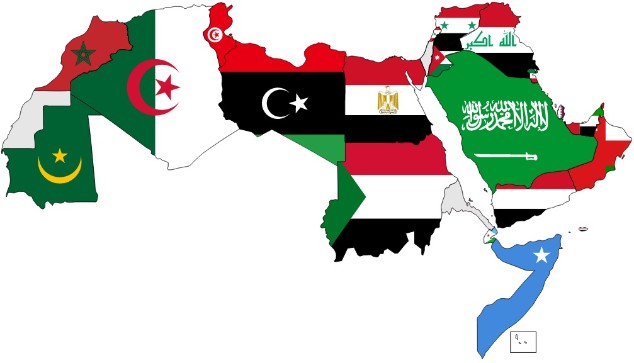
Countering terror, and the wider challenges in the Middle East
Four key events happened in regard to the Middle East and our own national security last week.
First, last Thursday in London, the UK Government hosted a high level international conference representing 21 key nations on countering ISIL – known in the Arab world as the Daesh.
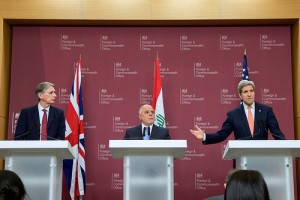 The conference reviewed the progress made and discussed changes in tactics that may be needed to defeat the Daesh. The conference examined the 5 pillars of effort – providing security assistance and strengthening the capacity of Iraq to stand on its own; protecting our homelands by disrupting the flow of foreign fighters; draining Daesh’s financial resources; providing humanitarian relief to victims; and, ultimately defeating what Daesh represents and countering propaganda.
The conference reviewed the progress made and discussed changes in tactics that may be needed to defeat the Daesh. The conference examined the 5 pillars of effort – providing security assistance and strengthening the capacity of Iraq to stand on its own; protecting our homelands by disrupting the flow of foreign fighters; draining Daesh’s financial resources; providing humanitarian relief to victims; and, ultimately defeating what Daesh represents and countering propaganda.
US Secretary of State John Kerry noted: “ we came together with the very same goal. We all understand that Daesh, as it is commonly known in the Arab world, is not simply a Syrian problem. It’s not an Iraqi problem. Daesh is a global problem, and it demands a coordinated, comprehensive, and enduring global response.”
The group reaffirmed that this task would not be easy, and will take time for completion.
We were also reminded of the fact that these efforts don’t operate in a vacuum or from just the coalitions perspective.
The Daesh reported that it had murdered two Japanese kidnap victims and continued its rape, enslavement and torture of the cities, towns and villages it had occupied.
The new Iraqi Prime Minster, Haider al-Abadi, noted that the low oil prices are dramatically affecting his countries ability to manage economically and fight ISIL. He noted: “oil prices have dropped to about 40 percent of their level last year. Iraqi economy and budget relies 85 percent on oil, and this has been disastrous for us.”
In the meantime vast amounts of people remain refuges, with out basic services, including education. This fact alone demonstrates a whole generation is being disenfranchised from the world community and will be subjected to mass poverty – the environment that groups like ISIL pray on.
Without firmer international action to support the refuges and political process to reintegrate them into a stable Iraq and Syria we are laying the groundwork for another ISIL.
Second, the Yemeni government and in fact the whole state resigned. Al-Qaida in the Arab Peninsular, based in Yemen, this is the terrorist franchise that is committed to striking America and its allies.
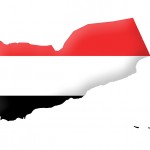 Over the last few years the United States had supported the Yemeni government in its political transformation and fight against al-Qaida. We have also launched numerous drone strikes against the terror networks there.
Over the last few years the United States had supported the Yemeni government in its political transformation and fight against al-Qaida. We have also launched numerous drone strikes against the terror networks there.
The Houthis insurgency that deposed the Yemeni government and state is Shiite that is heavily backed by Iran, and will now lead to wider fracturing of Yemen.
A new civil war is highly likely to start pitching Shiite against Sunni, this undoubtedly will lead to further recruits for Sunni Al-Qaida groups.
This destabilization will have huge impacts for the security of regional allies and the U.S. homeland.
Third, King Salman took over Saudi Arabia after the death of his half-brother King Abdullah. As a major US ally in the Middle East, the (now) second largest oil producer in the world, and more importantly home to the birth and two most holiest site in Islam, whole rules the desert kingdom is of vital importance to the U.S.
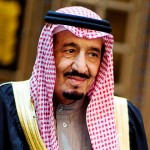 The new King quickly stated that he will continue the policies of his predecessors as well as appointing a new generation of Saudi Prince to the succession (Prince Nayef, 55, is now Deputy Crown Prince).
The new King quickly stated that he will continue the policies of his predecessors as well as appointing a new generation of Saudi Prince to the succession (Prince Nayef, 55, is now Deputy Crown Prince).
But, this gives the false impression that stability has been achieved.
There is no doubt that the ages for the new King (79) and Crown Prince (69) will lead to further changes in the Saudi regime in the next few years; the low price of oil will effect the budget in the Kingdom, now expected to be in a deficit for the first time in over 6 years; the conflict in Yemen may mean that the Saudi government is forced to intervene there militarily; the Daesh continues to bare down on the kingdom; and the internal tensions of Saudi may fracture during such quick regime transitions.
All this will mean that King Salmon and other leaders in the Kingdom will need to take an active role in managing these potential crises.
And finally, President Sisi, the leader of the largest Arab nation, home to the leading Islamic institution of Al-Azhar University, spoke to the World Economic Forum in Davos.
He spoke on the need for wider economic reform and investment: “Egypt should reiterate its commitment to open up to the world and to contribute to finding solutions to the shared challenges we all face.”
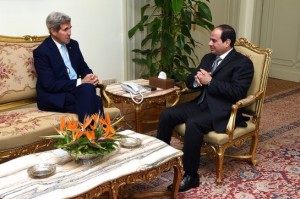
Secretary Kerry meeting with President Sisi on October 13, 2014
Sisi took forward his speech at the beginning of the year with the need to look at the challenged regarding ISIS, Al-Qaida and other linked group, he said. “The blood that terrorists spill in Egypt, Iraq, Syria, Libya, Nigeria, Mali, Canada, France or Lebanon is all of the same color”. He reaffirmed that “We must therefore mobilize all our efforts to eliminate the menace wherever it exists.”
He noted that “the terrible terrorist attacks which we have seen and this terrible image of Muslims is what led us to think that we must stop and think and change the religious discourse, and remove from it things that have led to violence and extremism….We need a new discourse that will be adapted to a new world and will remove some of the misconceptions.”
What does this mean for the United States?
Short Term
- We have a growing crisis in Yemen that may lead to strengthening Al-Qaida – which directly effects US interests and the homeland
- The low price of oil is effecting our allies ability to counter the Daesh
- President Sisi is leading an economy, social and religious reformation in Egypt and the region, this urgently needs supporting.
Medium Term
- Saudi stability should not be taken for granted.
- We need to increase our support for refugees fleeing Syria and the Daesh in Iraq
Long Term
- The implications of a vast amount of poor disenfranchised refugees in the region need to be urgently assessed.
- Without a longer term economic and social transformation for the region groups like Daesh will continue to spout and threaten American and global security






[…] Countering terror, and the wider challenges in the Middle East Paul Hamill Four key events happened in regard to the Middle East and our own national security last week. […]
[…] Security Project. Paul points out that Egypt and the United States share a number of strategic and national security interests. Egypt is the largest Arab nation and therefore is a cornerstone of economic, social and […]